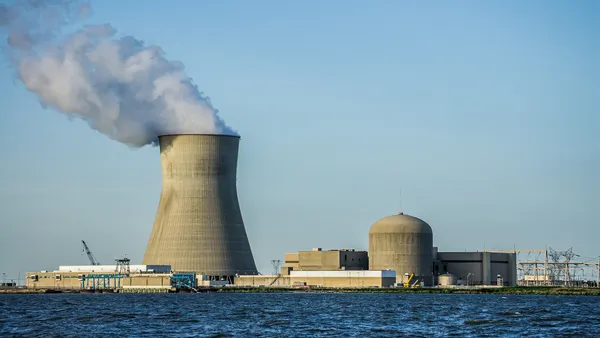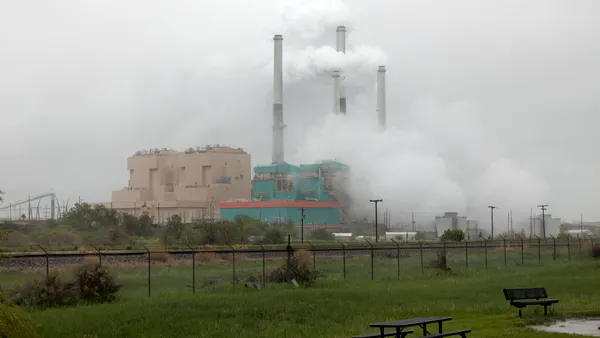Dive Brief:
-
Federal Energy Regulatory Commissioner Cheryl LaFleur will consider the broad climate impacts of new natural gas infrastructure when voting on whether to approve new projects, the regulator announced Wednesday.
-
FERC last month ruled in a 3-2, party-line vote that it will only consider greenhouse gas emissions from specific pipelines, rather than a project's expected impact on production and consumption of natural gas. LaFleur wrote she will still consider those broader estimates as she evaluates new projects.
-
LaFleur’s announcement, issued as a concurrence in a Tennessee pipeline case, comes as FERC undertakes the first review of its pipeline approval policies since 1999. The Democrat commissioner wrote FERC's position on analyzing climate impacts should be "thoroughly reexamined" in that review.
Dive Insight:
LaFleur's stance on climate is unlikely to change FERC decisions on pipeline approvals immediately, as the three Republicans on the five-member commission steadfastly oppose a broader emissions review.
Her position, however, will shape at least one pipeline vote at FERC and could provide a model for how future commissions will approach the issue, should Democrats regain a majority.
In her concurrence, LaFleur wrote that despite "strong disagreement" with FERC's climate review policies, she found Tennessee Broad Run Expansion project — a capacity upgrade to an existing pipeline in the state — "may be needed to serve customers and is in the public interest."
Instead of issuing dissents over GHG accounting in such pipeline cases, LaFleur wrote that she now wants to "move beyond our disagreement on the Commission's approach, however important it may be, to consider whether a particular project is in the public interest.
"I will base this determination on the facts in the record — even ones overlooked by the majority — and the governing law as I read it," she wrote.
In this case, LaFleur wrote that applying EPA methods for analyzing downstream greenhouse gas emissions reveals an "upper bound" emissions estimate of 3.7 million metric tons of CO2 resulting from the project.
"I recognize that this full-burn estimate is simply a mathematical derivative of pipeline volume, but I still want to disclose it and consider it as part of my public interest determination, particularly where there is not more precise evidence of downstream pipeline utilization," LaFleur wrote. "More information in the record with an identified end use would enable the Commission to more accurately assess the indirect impacts of downstream GHG emissions by calculating gross and net GHG emissions."
LaFleur's desire to "move past the disagreement" on climate accounting does not appear to be shared by the other Democrat on FERC, Commissioner Richard Glick. As in each major pipeline decision since his appointment, Glick wrote that failure to address broad climate impacts of gas infrastructure "falls short" of FERC's mandate to "identify the consequences that our decisions will have for communities, individuals, and the environment."
"I cannot support issuing a certificate where the Commission has not made its best effort to consider a project’s potential contribution to climate change," Glick wrote.
The day after the decision was issued, Glick said in a statement to Utility Dive that he would base his votes off information in the record reviewed by the rest of FERC, which at present does not include the expanded greenhouse gas accounting.
"I commend Commissioner LaFleur for her work in this area and strongly agree that the Commission should be considering the result of downstream impacts on climate change in its balancing determination," Glick wrote in an email. "Unfortunately, the calculation performed by Commissioner LaFleur, does not become part of the record – which is the same record that will be reviewed by an appellate court. Until the Commission changes its practice of excluding this information from the record, I may be forced to dissent depending on the facts of each proceeding."
The Democratic regulators and environmental groups say FERC must consider broad climate implications to comply with a Dec. 2017 D.C. Circuit Court order saying regulators did not properly account for potential emissions from a Florida pipeline project. At a hearing with FERC commissioners this week, Sen. Maria Cantwell, D-Wash., said she struggles to see how the current pipeline policy "squares with the DC Circuit decision."
FERC Chairman Kevin McIntyre gave little indication at the hearing of how FERC's ongoing pipeline review would consider carbon emissions, but said he wants to shorten review times.
"I have no interest in initiating a review of our gas certificate policy area for the purpose of slowing anything down," McIntyre said. "My interest is in streamlining and making more efficient the processes that we have."
This post has been updated to reflect comment from Commissioner Richard Glick.













